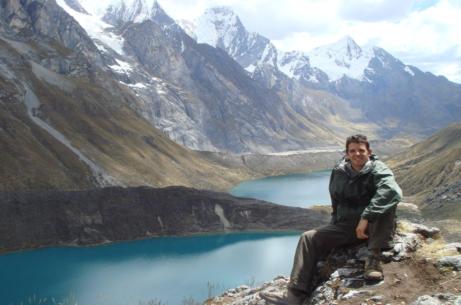
Anthony Lamb is starting a PhD studying the interaction between the agricultural industry and the environment, an issue he thinks is as much a social one as an environmental one.
Anthony Lamb had spent most of his adult life studying science and working in finance when he decided to take time out of his finance job in 2010.
He spent the next year or so reflecting on what he wanted to do. He loved the outdoors life and spent a month canoeing on his own down the Murray River, camping along the way. The river is at the centre of a debate about the impact of the food industry on the environment. Anthony then spent a few months surfing in a remote coastal area where he got involved in a local conservation group looking after koala and quoll populations.
In a sense it was a return to his childhood passions, one which has led him to the University of Cambridge where he is beginning a PhD in Zoology.
Anthony [2012] was born and lived in Perth, Australia, until he was 24. As a child, his family would go camping regularly and he was heavily interested in sports, especially surfing. He went to the University of Western Australia, where his father was a researcher in developmental biology. Both his parents had a background in medicine. His father is now a GP and his mother is a midwife. One of his sisters is also a doctor.
With such a strong science background, it was not a surprise that Anthony chose to do a degree in physics, maths and engineering. However, he was always interested in the social side of engineering and saw engineering as a tool for social change. For that reason, when he graduated he opted to work in the finance sector as he wanted to influence what engineering projects were done. “I realised nothing happens unless the money is there, that money drives decisions,” he says.
He took a job in Sydney which involved looking at infrastructure projects, including water, airports and renewable energy, and trying to make them happen by securing the right investment from different stakeholders.
He chose to move to the company’s London office soon after where he stayed for around seven years until 2008, progressing up the career ladder to a management position. His sister, who is working in agriculture, was also living in London at the same time. The family have strong links with the UK – Anthony’s father was born in Scotland and, although he emigrated to Australia when he was five, he did his PhD at the University of Edinburgh. Anthony himself has a British passport and still has family in the UK.
Before heading back to Australia, Anthony travelled round Europe and he worked for the finance firm for a further year on his return before handing in his notice.
He says he didn’t know what he was going to do when he left. “I just had a realisation that it was not for me any more,” he says. “I had enjoyed the work and found it challenging and rewarding, but I became less and less comfortable with profit being the bottom line even though we were doing some constructive things. It was not where I wanted to direct my energies long term.”
He spent the next year or so deciding what to do. He had an idea that he wanted to do something linked to the environment. “When I had time to reflect I realised that was where my passion lay,” he says.
He enrolled on a masters degree in environment at the University of Melbourne. It was a broad-based course and gave him a good grounding in the whole spectrum of issues involved. He found conservation science the most interesting as it drew on his maths and physics background.
For his PhD he decided he wanted to study the interaction between the agricultural industry and the environment, an issue he thinks is as much a social one as an environmental one. One of his lecturers at the University of Melbourne knew Professor Andrew Balmford, his now supervisor at the University of Cambridge, and suggested he email him. He was interviewed for a Gates Scholarship by Skype earlier this year.
As soon as he got his place he was eager to start work and soon after arrived in Cambridge, where he is working with the Conservation Science Group. He says: “We demand a lot of our land. We want it to produce food, fresh water and timber, store carbon and be a place we can use for our recreation. A lot of these things are in conflict. What I am interested in is looking at how we can best set up our landscapes to provide all of these things and reduce the conflict between them,” says Anthony. “Agriculture has traditionally taken precedence as populations grow, but it has to be managed carefully because once the land deteriorates it is not able to produce as much food.”
Anthony is looking to develop some global principles which can be applied locally. He aims to start with Europe where land use is well documented and see if there are principles which could be applied elsewhere, particularly in developing countries. “The trade-offs and political and financial challenges are greatest there,” he says.












